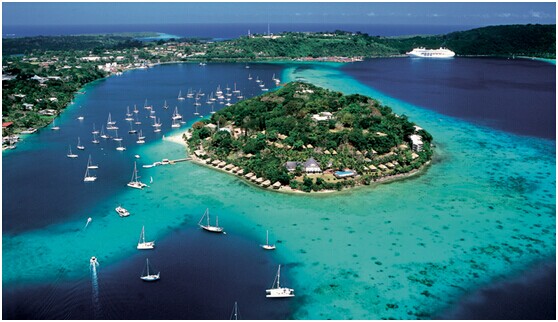Vanuatu
Vanuatu's economic freedom score is 59.5, making its economy the 93rd freest in the 2014 Index. Its score is 2.9 points better than last year, reflecting a substantial improvement in investment freedom that outweighs combined declines in business freedom, freedom from corruption, and labor freedom. Vanuatu is ranked 18th out of 42 countries in the Asia–Pacific region, and its overall score is just below the world average.
Vanuatu was first assessed in the 2009 Index, and its economic freedom has advanced only modestly. Improvements in five of the 10 economic freedoms, including investment freedom, monetary freedom, and labor freedom, have been offset by declines in trade freedom and business freedom. Although it’s economy is still ranked “mostly unfree,” Vanuatu has achieved its highest score ever in the 2014 Index.
Stronger commitment to institutional reform is needed to spark development of a truly dynamic private sector. Property rights are poorly protected, and inadequate legal infrastructure deters investment. Corruption continues to undermine the rule of law. High tariffs and non-tariff barriers to trade hold back integration into the global marketplace.
The Republic of Vanuatu, 83 islands spread over 4,500 square miles of the South Pacific, achieved independence in 1980 and is today a parliamentary democracy that remains divided between its English-speaking and French-speaking citizens. In the 2012 elections, 18 parties won seats in the legislature, with the Vanua’akuPati party winning the most seats at eight. Sato Kilman served as prime minister until March 2013, when several members of parliament crossed the aisle to join the opposition and forced Kilman to resign. The legislature subsequently elected Moana Carcasses Kalosil of the Green Confederation party as prime minister. The economy is dominated by tourism and agriculture, and over 80 percent of the population is involved in farming, which accounts for roughly 20 percent of GDP.
Rule of Law
Corruption is a serious problem, and official abuse is serious and widespread. Vanuatu has a fairly effective legal system based on British common law, and the judiciary is largely independent, but a lack of resources that hinders the hiring and retention of qualified judges and prosecutors results in backlogs. Tribal chiefs often adjudicate local disputes. Land disputes are a constant source of tension.
Limited Government
Vanuatu has no individual income or corporate tax. Taxes include a value-added tax (VAT) and import duties. The overall tax burden is 16.4 percent of the size of the domestic economy. In recent years, government spending, which accounts for 25 percent of GDP, has been dominated by the health and education sectors. Public debt is equivalent to 20 percent of gross domestic output.
Regulatory Efficiency
Bureaucratic procedures are complex and lack transparency. Incorporating a business takes more than a month, and completing licensing requirements costs over four times the level of average annual income. Labor regulations are relatively rigid, although the formal labor market is not fully developed. Prudent fiscal and monetary policies have kept fiscal deficits, public debt, and inflation lower than elsewhere in the region.
Open Markets
The average tariff rate is 18.5 percent. Vanuatu is working to upgrade its customs procedures. The government screens new foreign investment, and foreign investors may lease but not own land. The financial sector remains rudimentary. The state-owned National Bank of Vanuatu has the largest branch network in the country. Bank lending has increased in recent years, but access to secure financial services remains poor.
Source: 2014 Index of Economic Freedom

